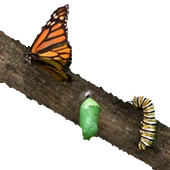Vertebrate and Invertebrate Worksheets

Vertebrate and invertebrate worksheets and animal life cycle lesson plans that are designed for high school, middle school, and elementary school life science teachers are downloadable here for free. NGSS Life Science offers many great science lessons. Vertebrate classification worksheets make learning classification fun. Click the Free Lesson Plan (PDF) link below or become a member to get access to the answer key and editable file. Free vertebrate and invertebrate curriculum includes:
-

Vertebrate Worksheet - Taxonomy Free Lesson Plan
High School Worksheet
In this vertebrate worksheet, students use a concept map to interpret how animals are related.NGSS Standard
HS-LS4-1
HS-LS4-5
HS-LS4-6
MS-LS1-4 (Animal Plant Structures)
Published by Shannan Muskopf
-

What is Life Worksheet - Frozen Frog  Free Lesson Plan (PDF)
Free Lesson Plan (PDF)
Lesson Plan (DOCX) & Answer Key with Membership
High School Worksheet
This is a great twist on an interesting fact that wood frogs can freeze in the winter and thaw in the spring to resume living. Students will evaluate claims and evidence on if a frozen frog is alive. This worksheet helps students to build their claim evidence and reasoning skills.NGSS Standard
HS-LS2-6
Published by NGSS Life Science
-

The Science of Ape Intelligence Free Lesson Plan
Free Video
High School Multimedia
Student will watch the video about the science of ape intelligence and, after watching, discuss answers to questions related to similarities and differences between intelligence in apes and in humans. Students are first organized into teams to track experiments and field observations. Students then watch the video (online or by DVD) and take notes on their topic. Student next will meet in their groups and fill in the two worksheets. Lastly, student will have a class discussion about the topics discussed.NGSS Standard
HS-LS2-8
MS-LS1-8 (Brain)
Published by Margy Kuntz, NGHT, Inc. and WGBH Educational Foundation
-

External Anatomy of a Frog Free Lesson Plan
High School Lab
The eyes, legs, and mouth of the frog is dissected and analyzed.NGSS Standard
HS-LS1-2
MS-LS1-3 (HBS)
MS-LS1-4 (Animal Plant Structures)
Published by Shannan Muskopf
-

Fetal Pig Dissection Free Lesson Plan
High School Lab
Fetal Pig dissection lab manual.NGSS Standard
HS-LS1-2
MS-LS1-3 (HBS)
MS-LS1-4 (Animal Plant Structures)
Published by Shannan Muskopf
-

Group Behavior Test Question Bank  Free Lesson Plan (PDF)
Free Lesson Plan (PDF)
Lesson Plan (DOCX) & Answer Key with Membership
High School Test
The animal group behavior quiz question bank includes natural selection, mutualism, parasites, altruism, and sentry behavior. You can use the question bank to build assessments, and active membership is required to view questions.NGSS Standard
HS-LS2-8
Published by NGSS Life Science
-

Intro to Sponges Free Lesson Plan
Middle School Worksheet
Students will read and answer questions on a sponge's anatomy, physiology, reproduction and metabolism. Students will also color drawing for corresponding body parts.NGSS Standard
MS-LS1-4 (Animal Plant Structures)
MS-LS3-2 (Types of Reproduction)
Published by Shannan Muskopf
-

Invertebrate Lab: Earthworms and Soil Fertilization Free Lesson Plan
Elementary School Lab
How do earthworms influence soil structure? Students observe and discuss how worms ingest soil, break down organic matter, and eject material as surface or sub-surface casts. Also discussed is the formation of water-stable aggregates, the aeration of the soil, and the improvement of soil water-holding capacity.NGSS Standard
MS-LS2-1 (Resource Availability)
5-LS2-1 (Movement of Matter)
4-LS1-1 (Plant Animal Structures)
Published by Carolyn Matthews
-

Invertebrate Lab Free Student Handout
Free Teacher Notes
Elementary School Lab
In this invertebrate lab, students compare the anatomy of earthworms, snails, and several arthropods. All of the invertebrates in this lab can be purchased at a low cost from a local pet store.NGSS Standard
MS-LS1-4 (Animal Plant Structures)
4-LS1-1 (Plant Animal Structures)
Published by Ingrid Waldron and Jennifer Doherty
-

Arthropod Poetry Free Lesson Plan
Middle School Worksheet
Students read the rhymes about arthropods and predict which associated scientific term explain the rhyme.NGSS Standard
MS-LS1-4 (Animal Plant Structures)
MS-LS3-2 (Types of Reproduction)
4-LS1-1 (Plant Animal Structures)
3-LS1-1 (Life Cycles)
Published by Shannan Muskopf
-

Observation of a Living Earthworm Free Lesson Plan
Middle School Lab
Students observe a live earthworm and answer questions about the Phylum Annalida, segmentation, sides (dorsal, ventral, posterior, anterior), receptacles (clitellum, setae, seminal), and responses to stimuli.NGSS Standard
MS-LS1-4 (Animal Plant Structures)
MS-LS2-4 (Ecosystem Affect on Populations)
Published by Shannan Muskopf
-

Hydra Microscope Lab Free Lesson Plan
Middle School Lab
Students will observe a living and a preserved hydra using a microscope. Students will then draw what they observe and label the parts. Third, students will touch the hydra and to see how the it reacts. Last, students add some food to the slide and maybe watch the hydra feed.NGSS Standard
MS-LS1-4 (Animal Plant Structures)
MS-LS3-2 (Types of Reproduction)
Published by Shannan Muskopf
-

Vertebrate Classification Challenge Free Lesson Plan
Free Teacher Notes
Middle School Lab
Students practice a vertebrate classification using the organisms discussed in the Prentice Hall textbook called the Parade of Life: Animals.NGSS Standard
MS-LS2-5 (Biodiversity)
MS-LS4-2 (Anatomical Structures)
Published by Tracy Trimpe
-

Invertebrate Classification Challenge Free Lesson Plan
Free Teacher Notes
Middle School Lab
Students practice an invertebrate classification using the organisms discussed the Prentice Hall textbook called the Parade of Life: Animals.NGSS Standard
MS-LS2-5 (Biodiversity)
MS-LS4-2 (Anatomical Structures)
Published by Tracy Trimpe
-

Food Chain Lab - Owl Pellets Free Student Handout
Middle School Lab
In this food chain lab, students dissect owl pellets to learn how the owl is part of a food chain. Since the owl regurgitates these compact pellets, owl pellets are undigested parts that the owl eats, which contain fur and bones of small rodents. Dry pellets will not smell and are acceptable for students to handle with gloves.NGSS Standard
HS-LS1-2
HS-LS2-4
MS-LS1-7 (Metabolism)
MS-LS2-1 (Resource Availability)
Published by Shannan Muskopf
